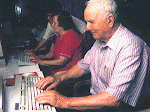Boise, ID - In response to increasing rates of obesity and sedentary lifestyles in the United States, more hospitals are increasing their focus on helping patients to successfully initiate and continue daily exercise routines, and working towards special recognition as "heart-friendly" facilities.
 |
| Boise General Hospital patient Jan Sand, shown here using a climbing wall to reach the rheumatology clinic on the 5th floor |
"Exercise, particularly when strenuous, has proven benefits and saves lives," Boise General Hospital CEO Skirt Romaine explained. "That's why we have replaced all of our elevators with climbing walls."
The Heart-Friendly Hospital Initiative (HFHI) is a program that helps hospitals in giving patients the information, confidence, and skills necessary to incorporate exercise into their daily lives. Heart-Friendly USA, Inc. is the non-profit organization that serves as the accrediting body and national authority for the HFHI in the United States. It is responsible for coordinating and conducting all activities necessary to confer the prestigious Heart-Friendly® designation and to ensure the widespread adoption of the HFHI in the United States.
The HFHI program is based on the Ten Steps to Successful Exercising, a set of practices that has been proven to increase exercising initiation and duration and that must be adhered to in order to achieve and maintain a Heart-Friendly® designation. The "Ten Steps" include two critical management procedures, such as ensuring that all hospital staff have sufficient knowledge, competence, and skills to support exercising, as well as eight key clinical practices:
- Discuss the importance and management of exercising with patients and their families.
- Facilitate immediate and uninterrupted access to exercise equipment and support patients to initiate exercise as soon as possible after admission.
- Support patients to initiate and maintain exercising and manage common difficulties, such as laziness, severe illness, and sleep.
- Do not allow exercising patients access to any sedentary activities unless medically indicated, such as an MRI or a colonoscopy.
- Enable patients and their exercise equipment to remain together 24 hours a day.
- Support patients to recognize and respond to cues for exercise readiness, such as alertness and the ability to move.
- Counsel patients on the use and risks of smartphones, laptops, televisions, chairs, and other artificial devices that may confuse a patient or distract them from exercising.
- Coordinate discharge so that patients have timely access to ongoing support and care, such as outpatient personal training and/or gym membership.
There is no question that exercising is the optimal method for movement of the human body. Over the past several decades, an abundance of scientific evidence has concluded that patients who exercise experience improved health outcomes and lower risks for certain diseases. Exercise is the natural conclusion to the development of a functional neuromuscular system and an important mechanism in the natural development of a patient.
Hospitals wield enormous influence during an admission and play a key role in exercising success. Before the HFHI program began to take hold across the US, commercial interests significantly influenced patient movement practices in ways that undermined exercising. Heart-Friendly® facilities are centers of support in which evidenced-based care is provided, education is free from commercial interests, all movement options are possible, and individual preferences are respected.
Heart-Friendly USA, Inc. aims to ensure that every patient is fully informed of the importance of exercising and has received the help they need to achieve exercising goals. According to Blenda Raff, an exercise consultant and president of Mother's Muscles, an organization that supports exercising women and advocates for laws making it easier to exercise in the workplace, the HFHI program also supports patients who don't exercise. "The program gets that exercising just isn't possible for some patients in certain situations, that inactivity is sometimes medically appropriate, and that some patients are lazy and will decide to just sit around doing nothing all day despite our hard work."

No comments:
Post a Comment